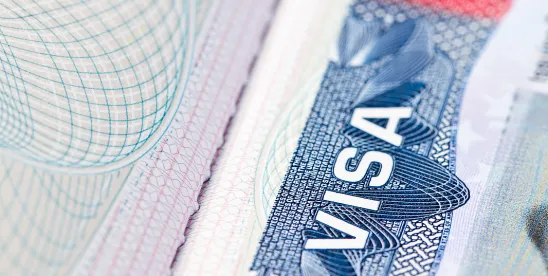We have previously written about the steps employers should take to ensure I-9 compliance and prepare for immigration site visits. In light of new immigration guidelines impacting visa holders, employers also should prepare for travel outside the U.S. (whether for personal or business reasons) by their employees with work visas.
Visa holders traveling outside of the U.S. for the first time on a new visa have to get their visa stamped at a U.S. Embassy or Consulate in order to return to the U.S. — recent immigration policy changes and changes to the visa processing procedure may cause delays in employees returning to the U.S. (and to work) from international travel.
First, in an executive order on January 20, 2025, President Trump ordered that all immigrants should be “vetted and screened to the maximum degree possible.” H-1B visa and other work visa holders traveling abroad, to get their visas stamped, will likely be subject to increased scrutiny under this directive. Employers should expect that more visas will be placed in “administrative processing,” in which the consular officer requires additional information from sources other than the visa holder to determine eligibility. Administrative processing can result in long delays, during which time visa holders cannot return to the U.S.
More recently, on February 18, 2025, the Department of State (DOS) announced changes to the Visa Interview Waiver, or “dropbox,” eligibility requirements. The dropbox process allows visa holders to get their visas stamped without attending an in-person visa interview, greatly reducing processing times for those eligible. Previously, the dropbox process was open to visa holders whose last visa expired within the prior 48 months. DOS has now reverted to pre-COVID guidelines, reducing the 48-month limitation to just 12 months and further limiting eligibility to visa applicants seeking approval in the same category as their prior visa. In other words, an H-1B holder can only use the dropbox process if they have a prior H-1B visa that expired within the last 12 months. An H-1B holder who previously held an F-1 (student) visa or whose prior visa expired more than 12 months ago is not eligible for the dropbox process. As a result, employers can expect that more employees will be required to attend visa interviews in person.
The visa stamping process is already fraught with long wait times, especially in countries where U.S. consulates process large numbers of visas, like India. With these changes, employees with work visas — and their employers — should be prepared for extended wait times for visa appointments, as more visa holders are required to attend in-person interviews. Employers also should be prepared for the risk that employees will “get stuck” abroad for weeks, or even months, if their visa is placed in administrative processing.
Here are some steps employers can take to prepare for the risks of international travel by employees with work visas:
- Remind employees to notify the appropriate employer representative well in advance of international travel. Employers should ensure that employees who are not eligible for the dropbox process timely schedule a visa interview that coincides with their travel.
- Confirm that the employee’s current job details match their latest visa filing to avoid any delays in processing. Material changes in the employee’s job, location, or pay may require an updated filing.
- Consider how to respond if an employee “gets stuck” while awaiting administrative processing or delays in visa interviews. Employers may decide to require these employees to use paid time off or unpaid leave to account of the additional delays. However, employees who “get stuck” may ask to work remotely from their home country while awaiting a decision. Employers should consult with counsel before agreeing to allow employees to work remotely from a foreign country, as such extraterritorial work typically raises tax and other employment law compliance implications.
- Stay on top of developments in immigration law, including travel bans, that may impact international travel by employees.




 />i
/>i

